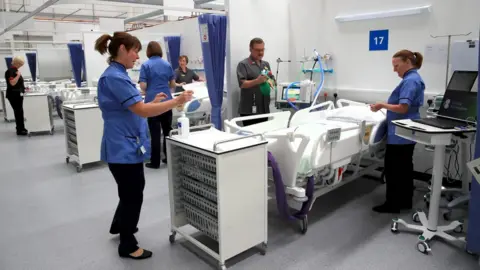Covid-19: Nightingale hospitals to close from April
 PA Media
PA MediaThe network of emergency Nightingale hospitals set up to cope with a surge of Covid-19 cases is to close from April, the NHS has said.
Established last spring amid fears that the NHS might be overwhelmed, the temporary hospitals in England were largely not needed.
Some were used as rehab centres and the sites in London and Sunderland will stay open for vaccinations.
The NHS said they had been the "ultimate insurance policy".
Seven Nightingale hospitals were built in England, starting in April 2020 with the 4,000-bed facility at London's ExCel centre. Another was set up in Belfast, while Scotland and Wales had their own temporary hospitals.
But they were never used on a large scale, because the NHS did not have enough trained staff to fill the Nightingales as well as the permanent hospitals.
During the winter surge in coronavirus cases, Chris Hopson of NHS Providers, which represents hospital trusts, said they had been built to avoid a situation like that seen in northern Italy in spring last year. But he said it would be a "success" if they were not used.
Yorkshire's 500-bed hospital, opened by Capt Sir Tom Moore, will close next month without treating a single patient. It will operate as a testing centre until then.
The London site treated 20 patients during the first wave of the pandemic. It reopened in January and was used to treat non-coronavirus patients to free up beds for a surge in Covid-19 cases and other very seriously ill people.
It was built in nine days, with its first 500 beds fully equipped with oxygen and ventilators. If it had reached full capacity, it would have been one of the world's largest hospitals.
Exeter's Nightingale hospital began admitting patients in November, when cases in the South West of England exceeded the first wave of the pandemic, with the NHS describing it as an "invaluable resource".
An NHS spokesman said that as the health service learned more about Covid-19 and how to successfully treat it, existing hospitals were able to adapt to increase critical care capacity.

"Even in the winter wave - which saw more than 100,000 patients with the virus admitted in a single month - there were beds available across the country," the spokesman said.
But the NHS said the Nightingale hospitals had been "on hand as the ultimate insurance policy in case existing hospital capacity was overwhelmed".
